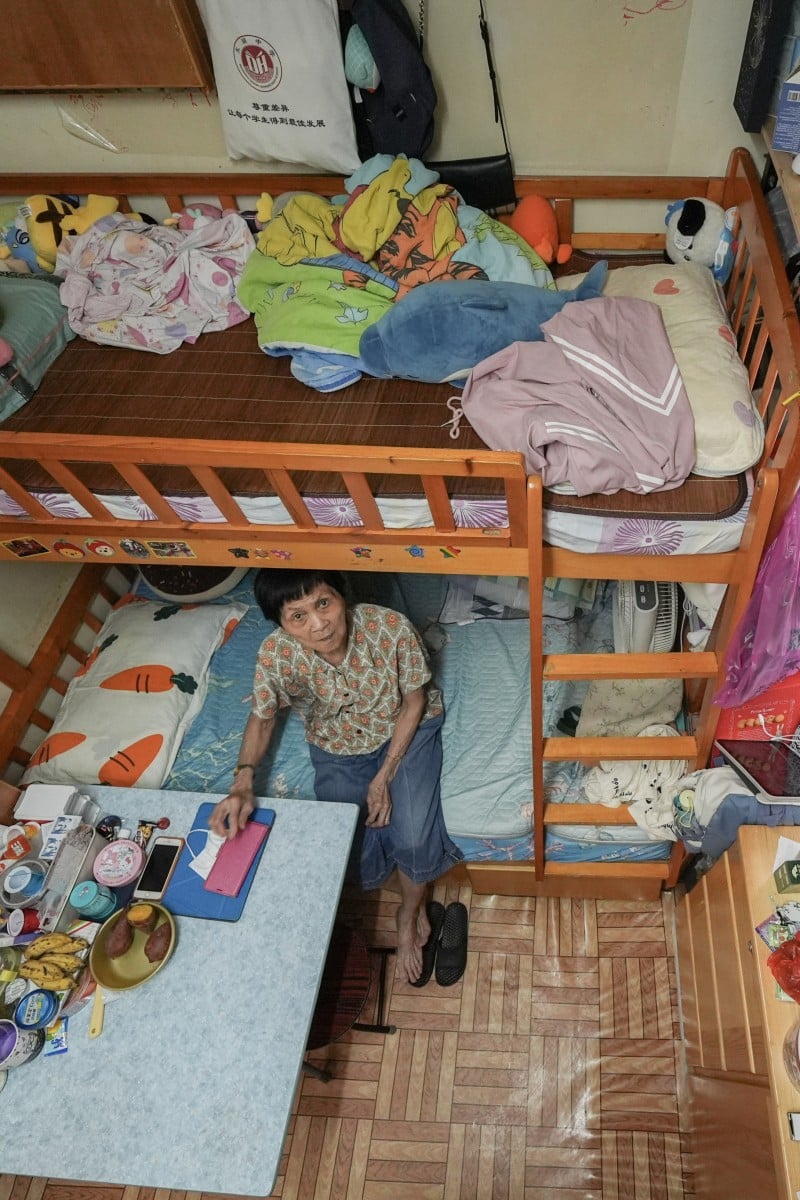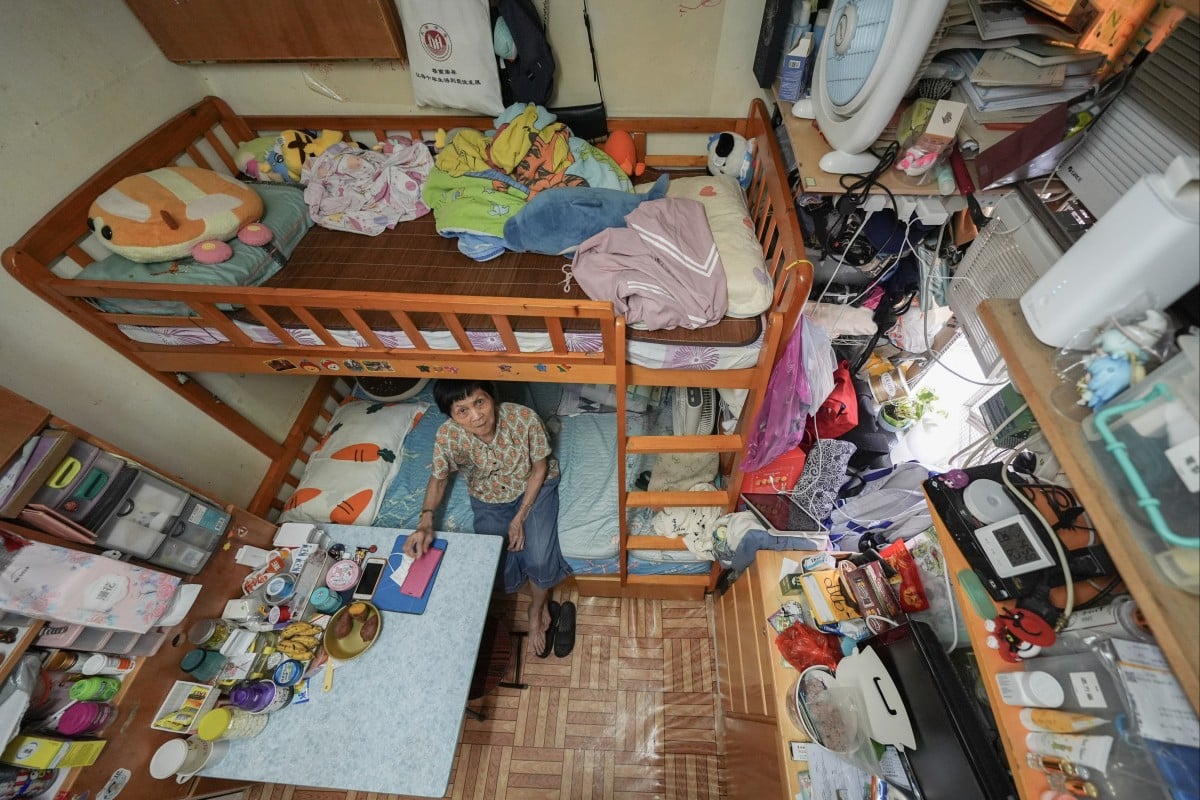
Deep Dive: Hong Kong to set minimum requirements for subdivided flats, says John Lee in policy address
Some question the time frame for the plan and whether it will actually help the city’s low-income residents.
 Huang Chaixiang, 79, poses for a photo at her subdivided flat in Sham Shui Po. Chief Executive John Lee Ka-chiu said in his policy address that a new law would ensure subdivided flats met new requirements, including having proper windows, at least one toilet per unit and a minimum size of 86 sq ft. Photo: Eugene Lee
Huang Chaixiang, 79, poses for a photo at her subdivided flat in Sham Shui Po. Chief Executive John Lee Ka-chiu said in his policy address that a new law would ensure subdivided flats met new requirements, including having proper windows, at least one toilet per unit and a minimum size of 86 sq ft. Photo: Eugene LeeDeep Dive delves into hot issues in Hong Kong and mainland China. Our easy-to-read articles provide context to grasp what’s happening, while our questions help you craft informed responses. Check sample answers at the end of the page.
News: Hong Kong announces new regulations for subdivided flats
-
Chief Executive John Lee Ka-chiu said in his recent policy address that a new scheme would ensure subdivided flats met certain minimum requirements.
-
Experts have questioned the roll-out of the plan and how it would help tenants of these units
Hong Kong has set its sights on improving life for those in subdivided flats. Chief Executive John Lee Ka-chiu said in his recent policy address that a new law would make sure these flats met certain minimum requirements. These could include having proper windows, at least one toilet per unit and a minimum size of 86 sq ft.
According to official data, about 30 per cent of the city’s 110,000 subdivided homes do not meet these requirements. This equals about 33,000 flats. More than 20 per cent did not meet the minimum size requirement. Meanwhile, about 10 per cent failed to meet other existing standards, a government source said.
Under the new scheme, owners will be required to register their subdivided flats. They will be given a grace period to carry out improvement works. They must then be checked by professionals for the home to qualify as a basic housing unit.
Lee said the registration period could be 12 to 18 months. It will be followed by a grace period of one to two years. The policy is expected to be passed by the Legislative Council next year. An insider said authorities may need about four years to tackle the problem.
Deep Dive: Hong Kong’s wealth gap widens as elderly poverty increases
Those living in substandard flats would likely be forced to move under the new policy. Lee said those people could eventually consider renting “basic housing units”. This is the government’s term for subdivided flats renovated to meet the new standards.
Lai Yuen-shan is an assistant professor at the department of sociology and social policy at Lingnan University. She said she expected the government to reveal more details about how it would enforce the scheme and supporting measures such as rent control.
“I am concerned about how the government will arrange resettlement measures for affected tenants to ensure their transition to transitional housing and other accommodation,” Lai said. She added that the government could give people money to help them move.
Lai also asked whether the government would limit the rent landlords could charge for the renovated subdivided flats. This would make sure residents would not pay a lot more money to “compensate” for the expense.
Angela Lui Yi-shan is a community organiser with the Society for Community Organisation. She believed the government’s proposed processing time was too long. “Four years to implement the new measure is longer than our expectation,” she said.
Staff writer
Question prompts
1. Based on News, which of the following statements is true?
(1) Around 33,000 flats do not meet the new minimum requirements for subdivided units.
(2) The entire process of implementing and enforcing the measures would take around four years.
(3) The new policy does not mention needing a toilet in the flat.
(4) The new standards include a minimum size of 100 sq ft.
A. (1), (2) only
B. (1), (3) only
C. (2), (3) only
D. (2), (4) only
2. According to News and your own knowledge, what obstacles would make it difficult to carry out this proposal?
3. Using News, list TWO ways the new regulations could affect the tenants of subdivided flats.
Comic
Question prompts
1. What message about housing in Hong Kong is the artist portraying?
2. Using News and your own knowledge, what other issues related to money and housing are depicted in the cartoon?
Issue: Landlords could face punishments for failing to meet housing standards
-
Penalties may include minimum jail term of two years, chief executive says
-
Government will consider public housing supply before carrying out enforcement actions
The Hong Kong government will consider the city’s supply of public housing and other factors before imposing penalties on landlords who lease subdivided flats that do not meet new minimum requirements, Deputy Financial Secretary Michael Wong Wai-lun has said.
Chief Executive John Lee Ka-chiu said the punishment could include a minimum jail term of two years, with three years also a possibility.
The government will launch a consultation exercise in December and start the legislative process next year. Authorities said they would refer to existing legislation and consult various stakeholders before making a decision on suitable punishments.
Secretary for Housing Winnie Ho Wing-yin said the government would decide on the time frame and targets for enforcement after landlords had registered their properties. “We will consider a basket of factors, including whether the building itself has a lot of subdivided flats or if data shows there are many tenants requiring help moving out,” she said.
Ho and Wong said the registration process was expected to start in the fourth quarter of next year and wrap up as early as the fourth quarter of 2026.
Registered landlords would then have a grace period of one to two years to rectify their properties and could continue to lease them during that time.
Deep Dive: Hong Kong NGO finds more than two-fifths of low-income residents battle food insecurity
The Concerning Subdivided Units Alliance said the proposed time frame was “too vague” and offered too much flexibility. “It is unclear when the government will take the enforcement action,” the alliance’s Lai Kin-kwok said.
Lai questioned the effectiveness of implementing such legislation without a clear enforcement plan, suggesting it would enable landlords of subpar flats to continue offering poor-quality living conditions.
Vera Yuen Wing-han, an economics lecturer at the University of Hong Kong, expressed concerns that the plan to phase out the smallest subdivided flats could lead to higher rents for other subdivided homes as long as demand persisted.
“If the government does not do anything, [tenants] will have to be squeezed into one unit with dividers,” she said. “[This] kind of model happened in Hong Kong, like in the 1950s and 1960s when a lot of families were living in one unit, sharing the living room and the kitchen.”
The latest government data showed the city’s public housing supply, including rental and subsidised sale flats, was expected to reach 43,600 by 2029-2030.
Staff writer
Question prompts
1. According to Issue, which of the following statements is true?
(1) Owners of subdivided flats will have three years to make renovations.
(2) The Concerning Subdivided Units Alliance feels that the government’s plans are too ambiguous.
(3) Within the next three to four years, the supply of subdivided flats will be over 43,000.
(4) Landlords could go to jail if they do not comply with the new regulations.
A. (1), (2) only
B. (2), (3) only
C. (3), (4) only
D. (2), (4) only
2. Based on Issue, name TWO ways in which flat owners could be enticed to comply with the new rules.
3. Using the information in News and Issue, name TWO concerns experts have voiced about the proposed measures.
Graph
1. Using the information, list TWO observations about the ages of tenants living in subdivided flats.
2. Based on Graph, note TWO ways subdivided units have changed from 2016 to 2021.
Glossary
subdivided flats: flats that have been divided into two or more separate units to house more people. They are typically quite small and aimed at lower-income residents.
policy address: a yearly speech given by Hong Kong’s chief executive. It outlines the government’s plans for the year, covering areas such as the economy, education, and housing. The purpose of the address is to create stronger communication between the government and Hong Kong residents by discussing policy changes and new schemes to better the city.
grace period: a set length of time after a deadline in which there is no punishment for not following a law or rule.
Legislative Council: also known as Legco, it is part of the Hong Kong government. The Legislative Council creates, changes and repeals laws. It also approves budgets and taxes and inspects the government’s policies and work.
public housing: affordable flats for low-income residents, typically built by the government. Nearly half of Hong Kong’s population lives in some form of public housing.
tenant: a person who lives in a flat or other property. Often, they rent it from the landlord - the person who owns it.
Sample answers
News
1. A
2. It would be difficult to help tens of thousands of people move out of their homes for an undetermined amount of time. It is also unclear where they would go, as the government has not offered details on transitional housing. There has not been any information about a moving allowance either, and people may be unable to afford to move.
3. Tenants may be forced to leave their homes and uproot their lives. They would likely need rent control in their new homes, per Lai Yuen-shan, since many of these people are likely on a budget. Landlords may also try to charge more for renovated flats to compensate for their expenses, meaning tenants may end up paying more than they can afford.
Cartoon
1. This satirical comic highlights the poor standards for subdivided flats in Hong Kong. The man on the right lives in a flat the size of a box, and yet the man on the left - presumably an inspector - said this tiny home meets the minimum requirements. The comic portrays the terrible living situations many Hongkongers find themselves in and implies that the government is unconcerned about the issue. (accept all reasonable answers)
2. The man on the right appears to live in one of Hong Kong’s tiny subdivided flats - or even a coffin home - and probably does not earn much money. He has stuffed his belongings in the small space he calls home. Even though it is too small for a person to comfortably live in, the space has still been declared a “basic housing unit” by someone dressed in a suit who likely makes more money. The cartoon could reflect how people in positions of power, or those who have money, tell lower-income individuals that their situation is fine when it is unlikely they will face a similar one themselves. (accept all reasonable answers)
Graph
1. Over time, the age distribution has skewed older. From 2016 to 2021, the percentage of people living in subdivided flats aged 65 or above increased from 8.2 per cent to 10 per cent. Similarly, the percentage of those aged 45 to 64 increased from 24 per cent to 30.2 per cent. Fewer younger people are living in these flats; the percentage of households aged 25 to 44 has decreased. (accept all reasonable answers)
2. The median flat size increased from 108 sq ft to 118 sq ft, along with the median living space per person. Despite this, the percentage of flats without an independent kitchen increased from 28 per cent to 34 per cent. (accept all reasonable answers)
Issue
1. D
2. Firstly, the owners will be given a reasonable grace period to make renovations, giving them enough time to make the necessary changes to the flat and bring it to standard. Also, if owners do not comply, they could face a minimum prison sentence of two years, which is a huge motivator to adhere to the new guidelines.
3. With the flats being renovated and upgraded, these tenants could face an increase in rent, which may not be feasible for many of them. Hence Lai Yuen-shan of Lingnan University felt that the government could put a cap on the rent. There is also concern that the new requirements would not be enforced, meaning landlords could secretly continue renting units below the standard. (accept all reasonable answers)
